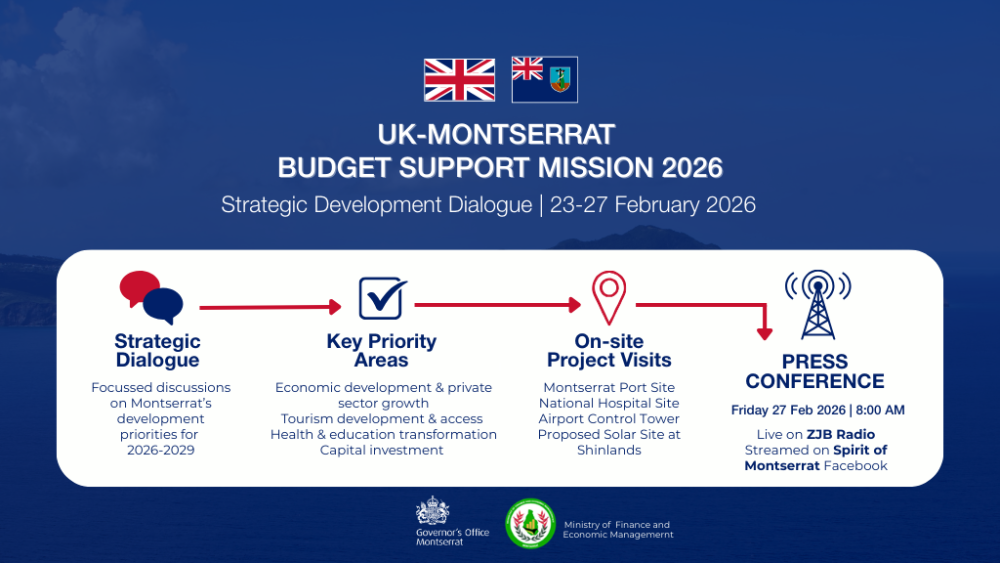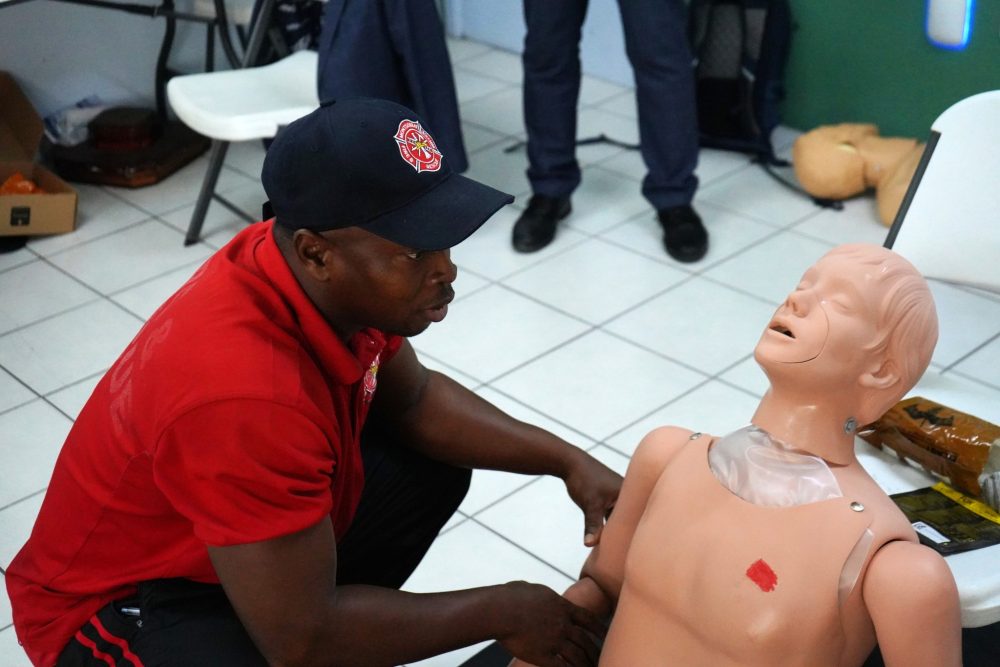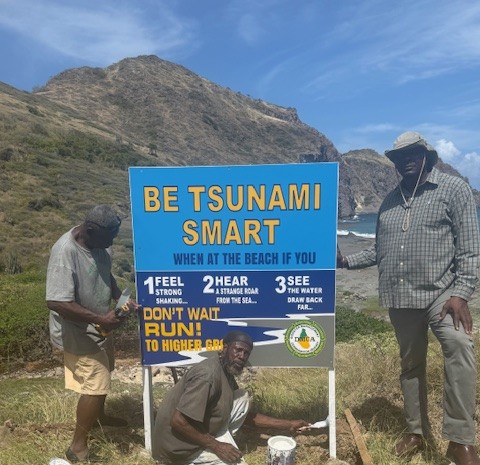by Hon Donaldson Romeo, MLA
The British Prime Minister, like other leaders around the world, has finally ordered strict bans and provided considerable funding to address the medical dilemma and economic fallout of the COVID-19 pandemic. Meanwhile, His Excellency Pearce, Montserrat’s British-appointed Governor, and Montserrat’s elected Premier, Hon Taylor are fumbling, unprepared and ill-equipped, weeks behind the curve of the crisis, in a country that has been over-exposed to the virus after a big influx of visitors to the St. Patrick’s Festival.

Just days ago the USA issued its strongest travel advisory, level 4, urging U.S. citizens to avoid all international travel due to the global impact of COVID-19.
Apart from the USA, many countries in the Caribbean and around the world experiencing COVID-19 outbreaks have implemented travel restrictions and mandatory quarantines. Some have closed borders, and denied entry to non-citizens. Many cruise operators have suspended operations or cancelled trips. So have airlines, leaving travelers stranded and some businesses at a standstill.
Many countries have declared a state of emergency in an effort to enforce a greater level of isolation, slow the spread of the coronavirus, and eventually wipe it out. Last week the Governor of Missouri, Michael Parson, declared a state of emergency when only two cases were found (out of a population of 6 million!). Why? To better control the level of people’s isolation, and to be allowed to waive certain state laws and regulations as needed to deal with the public health crisis. In addition, the declaration of a state of emergency permits the state to access extra funds and take additional actions to respond to the growing public health emergency.
According to statistics coming from Imperial College, London, if strict social distancing is observed, the UK can expect around 20,000 people to die over the course of a year, as opposed to up to 10 times as many (200,000) if strict social distancing is not practiced.
Previously the UK Government was slow to take drastic measures, simply requesting that people avoid unnecessary social contact, and businesses were not required to close. Yesterday (Friday 20 March) Pubs, bars, cafes, restaurants and many other venues across the UK were ordered to close, in a bid to slow the spread of COVID 19.
According to the online Guardian newspaper (March 20, 2020), the British Government “will cover 80% of the salaries of retained workers up to £2,500 per month, and defer the next quarter of VAT payments due from businesses”. It will also provide “£6 billion of extra support for the welfare system.” The scheme, says Metro, another London paper “will run for at least three months but can be extended if necessary and will have ‘no limit’ of funding.”
With these examples of what Governments around the world (and the British Government in particular) are doing, the Government of Montserrat is still in go-slow mode, with lightweight measures banning gatherings of more than 25 persons and only asking passengers arriving on Montserrat to self-isolate for 14 days. Apart from paying public servants 5 days early, there is no mention of assistance to the unemployed or to struggling businesses and people who have, for the past 25 years, been fighting to rebound from a volcanic crisis. And that despite the strong advice coming from our own EC Dollar Monetary Council (on which our Hon Premier sits), and which on Sunday March 15 declared that “the best action to minimize economic fallout from COVID-19 is containment supported by personal responsibility combined with proactive, and where needed, aggressive public policy”.
What is particularly worrying is that Montserrat’s only hospital is already short of equipment and staffing to deal with specialist medical conditions in normal times, never mind handling large numbers of the respiratory and other complications that would come with a COVID 19 pandemic. Since there is no testing equipment on island, samples must be flown more than 400 miles to Trinidad to be tested, with a turnaround time for results of 2 to 3 days. Therefore, one cannot tell in good time whether medical staff, or those with symptoms, or who have had contact
with an individual, are carrying the virus or not.
The Government of Montserrat and the Governor turned a deaf ear to appeals to cancel the St. Patrick’s Festival, and went ahead with the celebrations as usual, attracting more than 2,500 plus visitors to the island, and increasing its population by 50%.
On March 10, BA flight 2157 brought 300 plus passengers from London to Antigua. One of these passengers tested positive for the coronavirus – Antigua’s first confirmed case. Of the 80 passengers from the same flight that went on to Montserrat, one also tested positive, becoming the island’s first COVID-19 patient.
No doubt taking their cue from the Government’s timid approach to social distancing and to severely restricting travel into Montserrat, parties, bars, restaurants and many other venues and social gatherings continued as per usual throughout and after the festival period.
Many continue to argue that the Governor (constitutionally responsible for leading out in disaster management and mitigation, as well as security), and Montserrat’s elected Government, need not have taken such a gamble with lives. After all, because of prolonged economic stagnation since the volcanic crisis, HMG is already providing 60% of Montserrat’s recurrent budget and over 90% of its capital expenditure.
Not to mention the fact that in keeping with UN article 73, Montserrat is entitled to be treated as a priority recipient of aid from the UK Overseas Development Aid (ODA) budget of over 12 billion dollars (0.07% of UK’s GDP, totally separate from, and therefore not affecting, domestic spending). More to the point, many Montserratians fear a repeat of the belated and inadequate aid they have received since the beginning of the ongoing 25-year volcanic crisis.
So while the British Prime Minister, like other leaders in the Caribbean and around the world, enforces stricter bans on social distancing and promises billions of pounds in aid to British people and businesses, Montserratians are left, avoidably ill-equipped and vulnerable, to face an unprecedented pandemic. Our government has been hesitating instead of taking the radical action required to slow contagion, to provide adequate emergency health care, as well as measures for mitigating the inevitable social and economic impact of this new threat.
Will His Excellency Governor Pearce and our Hon Premier Taylor supported by HMG, consider calling a State of Emergency? When will they take the advice of our own Monetary Council and act swiftly to save lives and “to minimize economic fallout from COVID-19 containment supported by personal responsibility combined with proactive, and where needed, aggressive public policy”?
The British Chancellor declared yesterday:
“We want to look back on this moment and remember the many small acts of kindness done by us and to us. We want to look back on this time and remember how we thought first of others and acted with decency. We want to look back on this time and remember how in the face of a generation-defining moment, we undertook a collective national effort and we stood together.”
These are heartwarming words indeed, and Montserratians are waiting to know whether the Chancellor’s “we” includes us in the British Overseas Territories.
As we wait, we in Montserrat hold fast to the Hand of God that has been, and will continue to be, a Present Help in trouble to all those, governments and people around the world, willing to work together for the common good.
Discover more from Discover Montserrat
Subscribe to get the latest posts sent to your email.



